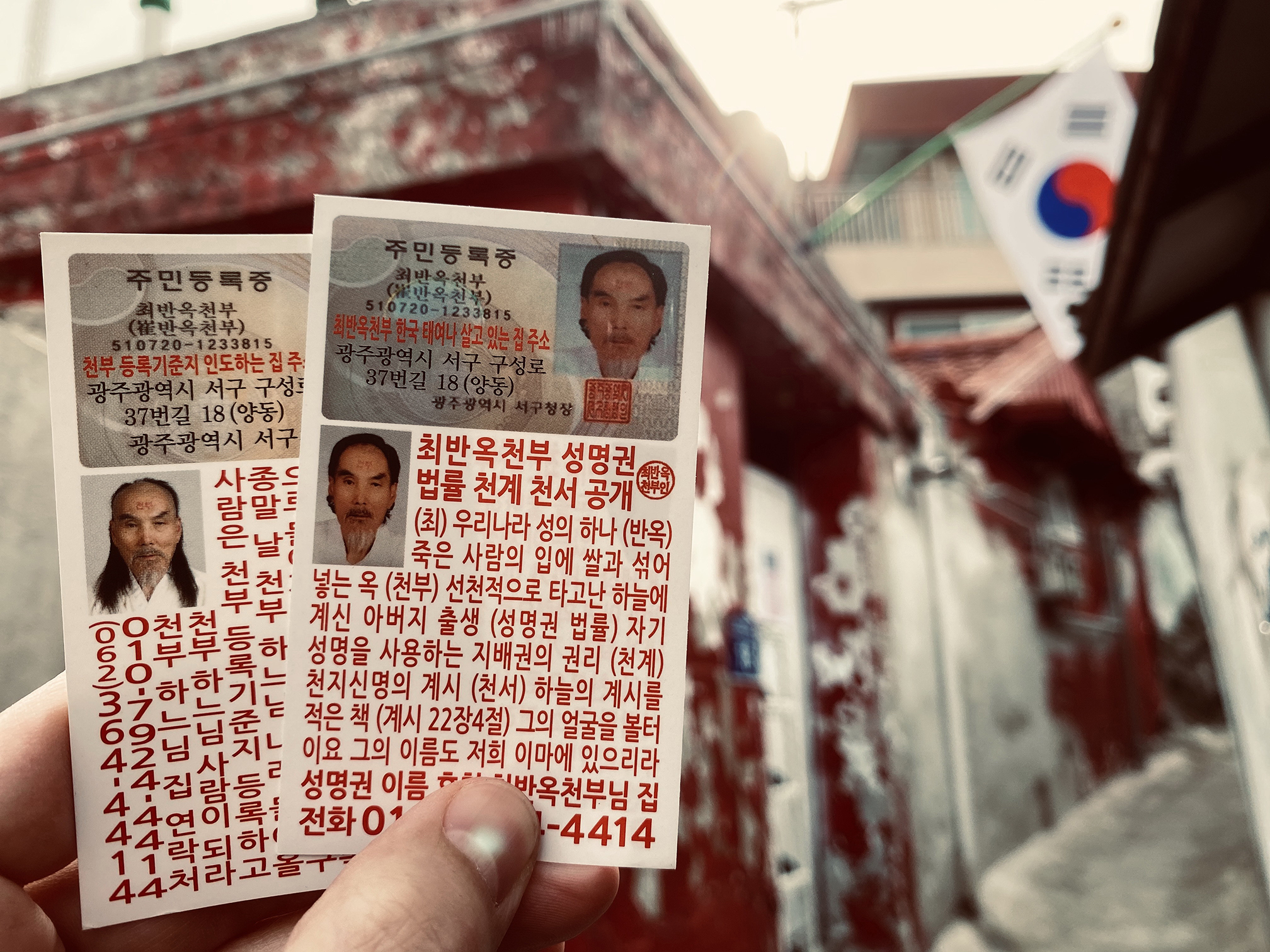Odds and (Dead) Ends: Spring Cleaning Edition
Written and photographed by Isaiah Winters.
It’s time for a special spring cleaning edition of bizarre leftover photos crowding my desktop. Like in the July 2019 edition of “Odds and (Dead) Ends,” these stories don’t quite pass muster as full articles individually, but together they don’t disappoint. I hope you share the same cornucopia of unwanted emotions I got when discovering them.
The New Testament (Yang-dong)
Gwangju’s very own “Heavenly Father” has updated his doomsday business card, and as his humble servant, I feel like it’s incumbent upon me to spread the news. The good news is that it seems there’s still time to avoid perishing in the rapture. You see, according to “Heavenly Father,” the Republic of Korea is possessed with evil demons and spirits, so on a day of his choosing, the Earth will be destroyed and those who haven’t changed their addresses to the random rice field addressed on the back of his new card will perish. Graciously, “Heavenly Father” has prepared a new world for all registrants, which I’m sure will come in handy. There’s one major condition though: The world awaiting us unfortunately isn’t for people who love money, so registrants would presumably have to forfeit their assets beforehand, though to whom I couldn’t possibly venture a guess.
The updated card from “Heavenly Father” bears more literary manna overleaf, and it couldn’t have come at a more opportune time. Apparently, if you want to be healed of any illness by his blessed hand, all you have to do is call the number listed – toll free! Now that such a trusty panacea exists, we can all get back to coughing in each other’s faces like it’s still 2019. I know I have. Speaking of faces, there’s one final detail I managed to divine from his New Testament card regarding why he has “Heavenly Father” (cheonbu, 천부) marked in red on his forehead. On one side, he quotes Revelation 22:4, which reads, “They will see his face, and his name will be on their foreheads.” It turns out that in New Jerusalem, God’s servants will actually be able to see him, and in a godly alternative to the mark of the beast, witnessing him will cause his name to be marked on their foreheads. I guess this means “Heavenly Father” has actually seen God for himself in New Jerusalem, which is all a bit confusing. If you’re similarly unsure who the real God is, then why not make the call and find out for yourselves?
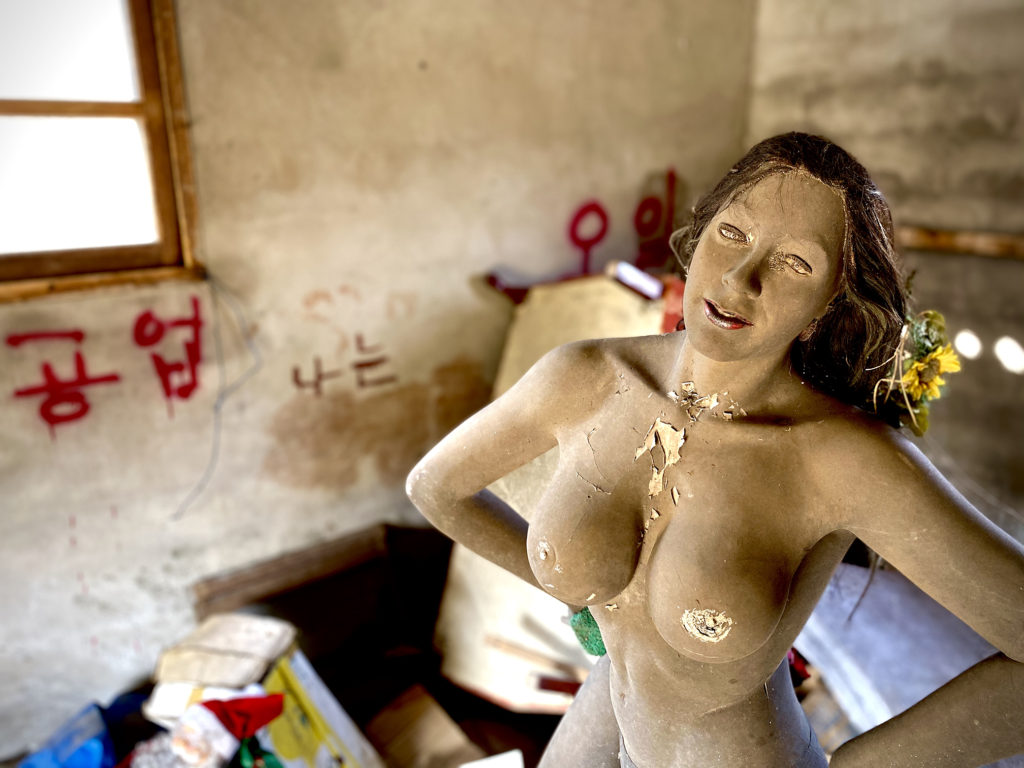
Farmstead Kink (Samgeo-dong)
In one of the farthest-flung corners still technically within Gwangju Metropolitan City limits is an abandoned poultry farm with a kinky secret. In a garage adjacent to one of the farmhouses, I found a headless Santa Claus, a child’s spring horse, and a full-sized topless statue of a woman in a G-string. (Whichever you consider to be the kinky secret is your business.) Arms akimbo, the highly detailed and proportionate mannequin bears some resemblance to the original Wonder Woman, though with a darker complexion. I’ll never know what role this titillating effigy played on a farm otherwise strewn with poultry cages, asbestos paneling, and bird bones. The only detail I could glean about the owners was that they were Jehovah’s Witnesses (based on the panoply of religious materials from the Watch Tower Bible and Tract Society of Pennsylvania found in the house). The stark cleavage between stacks of pious literature and a plaster temptress is another one of Gwangju’s many riddles, wrapped in a mystery, inside an enigma.
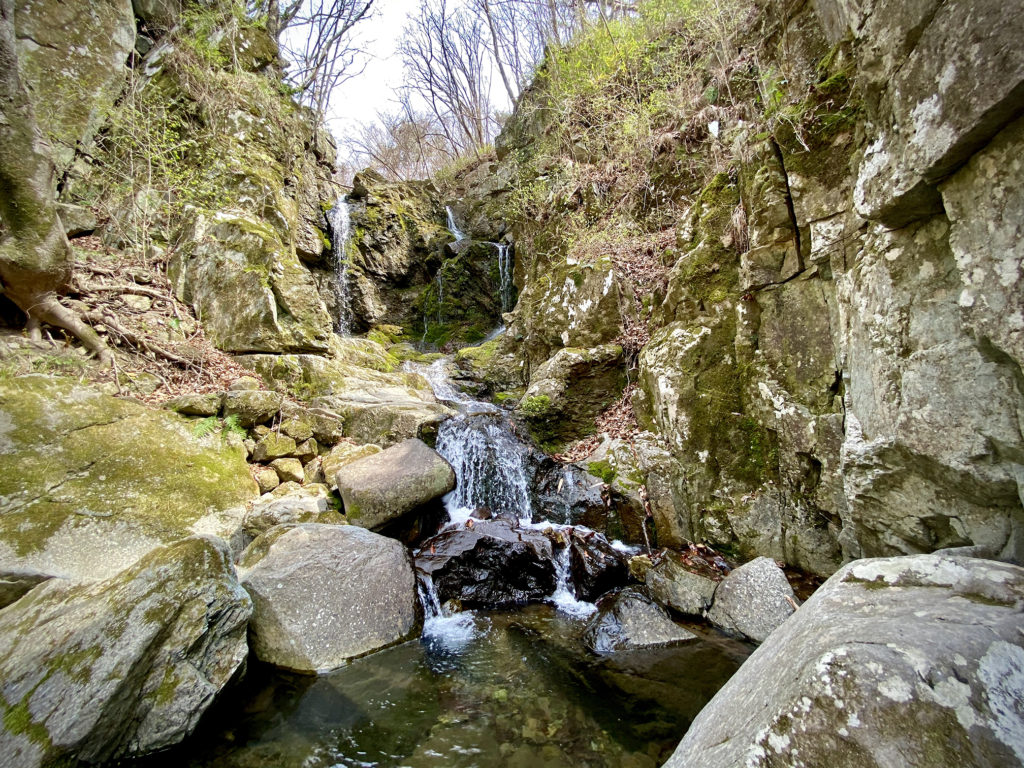
A Watershed Moment (Yongyeon-dong)
It took a pandemic for me to acknowledge the gelatinous muffin top cascading over my beltline. So, with nothing but time on my hands for endless self-ridicule, I decided to skimp on lunches and go hiking five days a week, each time at a different spot. There’s a lot of good hiking within the city limits if you break routines and know where to go. For example, I’d always heard that there were waterfalls in Mudeungsan National Park, but I never bothered to seek them out until this spring. Pictured is the trail along Yongchu Falls, which is an easy hike (more like a walk, really) that crisscrosses the falls multiple times for almost three kilometers. The grand finale is a series of falls that, at least when I was there, was completely bereft of anyone but myself. A similar experience happened when I visited the far higher Shimujigi Falls on the backside of Mudeung Mountain – the only difference being that I didn’t see a single soul along the latter trail.
Interestingly, in the absence of hikers, regional wildlife has become braver. For instance, over the course of two separate hikes in nearby Jangseong-gun, I spooked at least seven deer in places where I’d never seen them before. (I got into a staring contest with two of them, but lost.) Similarly, the usual squirrels, mice, woodpeckers, and pheasants are all getting easier to spot, too. Eventually, I’ll probably run into wild boar as well and so always try to keep in mind which nearby tree might be best to climb if charged. Still, the region’s burgeoning wildlife presence is a nice respite from the herds of makgeolli-swilling sapiens and their techno-trot mating calls. Barring future pandemics, I don’t think there will ever be a better time than now to get out and explore our surroundings with as much serenity. Ultimately, like the reemerging wildlife, introverts like yours truly are thriving in this new environment.
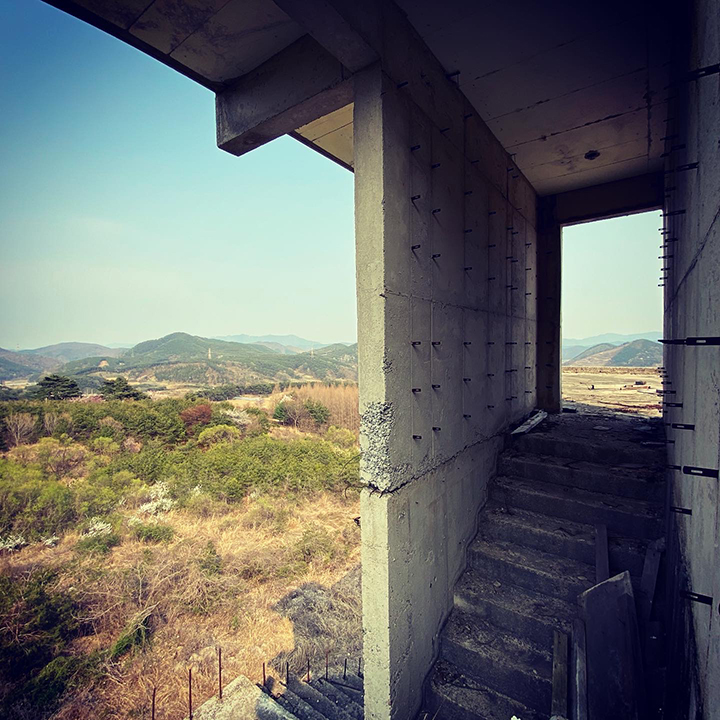
Monumental Hate (Mudeung Mountain)
“To the owner of this building: Don’t get conned by Messrs. Kim and Yun and their gang. Call the district architecture office at 010-– and ask. Don’t regret getting f**ked over.” This is the stern warning scrawled in red paint on the inner wall of this unfinished building along the backside of Mudeung Mountain – an area I like to call the “dark side of the Mu.” It seems the “gang” referenced may have seen the message because someone later spray painted over its most sensitive details in red. The only reason the message can still be read today is because someone else (likely the original writer) returned and sanded off the spray paint in certain parts, especially where it mentions Mr. Kim’s full name. All this deduction suggests a vitriolic tit-for-tat playing out on the otherwise sleepy back slopes of Gwangju’s fairest mountain.
Eventually, these husks of rusted rebar and chipped concrete become monuments to so many untold stories of hate, debt, and bankruptcy. I’m fascinated by these overlooked disputes and all the rancor and financial ruin left in their wake. In this case, the intended seven-story convalescent hospital remains forever stillborn and, according to a dingy signboard at the entrance, has had a lien on it since 2013. Nothing about the row seems to exist online, but the person who wrote the warning and the “gang” alluded to are nevertheless somewhere out there today with one hell of a story to tell about who owes whom what. Though admittedly morbid, my only hope is that whoever finally gets stuck with the debt doesn’t opt for felo de se.
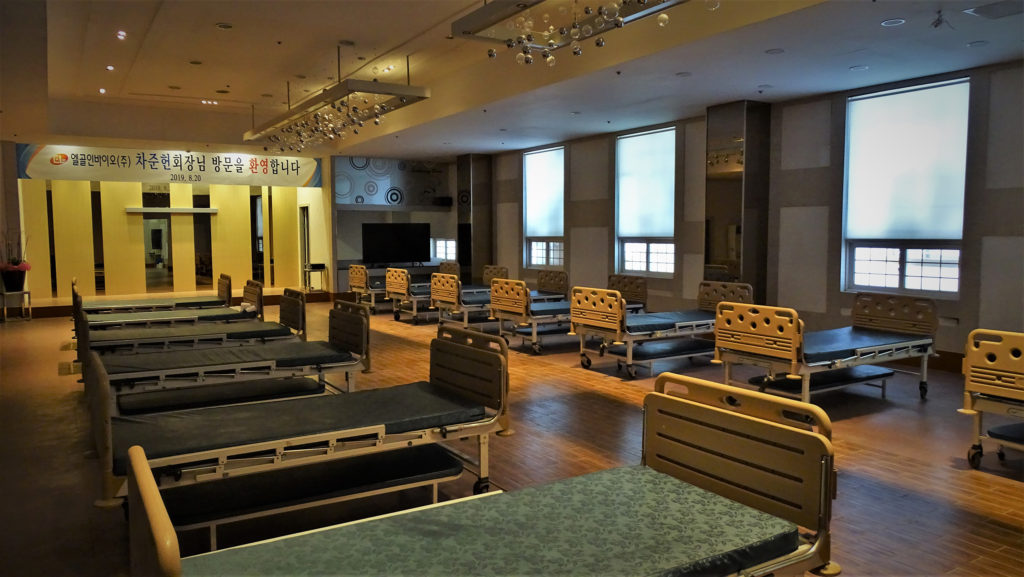
Chairman Cha’s Death Beds (Yongsan-dong)
About two weeks before COVID-19 began to take off in Korea, I stumbled upon this defunct wedding hall with working electricity. Otherwise useless until demolished, each individual wedding hall within has been repurposed as a showroom for different events, with the one pictured being by far the most unique. Lining the aisle where nervous brides once mincingly crossed into matrimony – with proud grooms in awe and all eyes moist with tears of joy – are rows of hospital gurneys that apparently served as seating for some macabre speaking engagement. The stage bore a banner welcoming Cha Jun-heon, pastor of the Work of Jesus Church and chairman of El Goal In pharmaceutical company. It seems he visited Gwangju last August for a seminar of sorts and, I guess, the gurneys were used as prop seating, maybe as a way to make the audience feel like they were sick and in need of Chairman Cha’s meds. His website slangs all sorts of detox products from soap and toothpaste to salt and water – and, of course, pills, pills, pills. Today the foyer of this particular wedding hall remains stocked with some of Chairman Cha’s merchandise under the banner, “In a low, humble manner of service.”
And that’s how I’ll finish this overlong article, dear readers: in a low, humble manner of service.
THE AUTHOR
Originally from Southern California, Isaiah Winters is a Gwangju-based urban explorer who enjoys writing about the City of Light’s lesser-known quarters. When he’s not roaming the streets and writing about his experiences, he’s usually working or fulfilling his duties as the Gwangju News’ heavily caffeinated chief proofreader.







